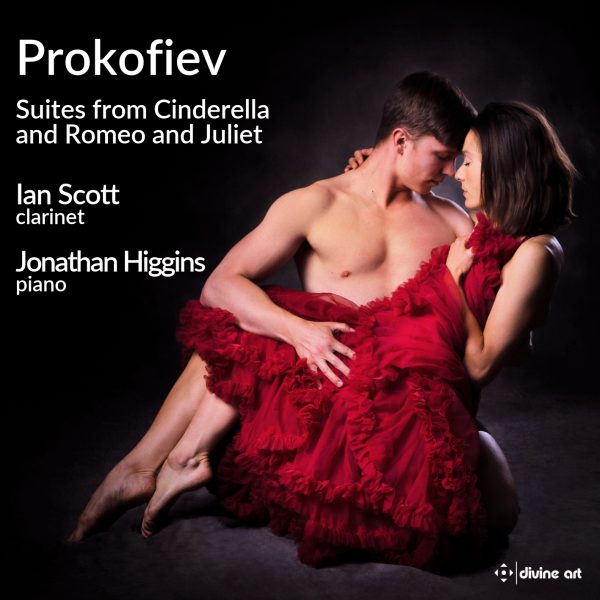De Klarinet
That the appealing ballet music of Sergei Prokofiev lends itself extremely well for a transcription for clarinet and piano can be defended in several ways. Prokofiev himself made piano transcriptions of a large part of his orchestral works and in the original setting of his ballet music he made extensive use of the various characters of the clarinet. That produces one nice foundation for this version. In typical English musical collaboration clarinettist Ian Scott and pianist Jonathan Higgins play highlights from the ballet suites Cinderella (opus 87) and Romeo and Juliet (opus 64). In part, they took advantage of existing arrangements by Bronislav Prorvich, but for most of the sections, clarinetist Ian Scott and producer Malcolm McMillan wrote transcriptions for this duo vision of Prokofiev’s ballet music. In both Cinderella and Romeo and Juliet the result is something like two captains on one ship: Prorvich set his arrangements with the orchestra as the cradle adding interpretations of the clarinet parts, while Messrs. Scott/ McMillan reasoned more from the perspective of the clarinet. That’s not strange at all, since both have for years been seated side by side in an orchestra and know each other’s musical wishes and possibilities. However the difference in vision indicates a diversity in the performance. One hears the characteristic English timbre of Ian Scott’s instruments by Peter Eaton (type Elite) – a derivative of Boosey & Hawkes, but t maybe a little more veiled in sound. Scott performs in the second and third registers impeccably and with great control, while his tone in the low register is not quite so smooth. Ian Scott’s interpretation is also remarkable in that it reveals the style of an orchestral musician, rather than a totally prominent, dominating soloist that one can often find in chamber music. This relatively short CD (50 minutes) is magnificent, if only for the always surprising twists and atmospheres which Prokofiev derives from his ballet music. It almost begs for an extrovert interpretation of clarinet and piano, but Scott, in particular, keeps quite a low profile, not becoming ‘flashy’. Perhaps the greatest energy of pianist and clarinetist in found in the Grand Waltz, where the inspiration for this transcription emerges in clearly audible fashion. Of course there is more recognisability in Romeo and Juliet. Its atmospheres and characters as present by Ian Scott and Jonathan Higgins have been exploited much more here and have translated into freer play, leaving natural space which allows for greater expression. Here too we note the ‘orchestral interpretation’ from Scott, so you don’t get the feel of extroverted chamber music playing. But the music in combination with the arrangement – because of its great impact of melody and rhythm – remains very strong, so this version will take some beating.
@divineartrecordingsgroup
A First Inversion Company
Registered Office:
176-178 Pontefract Road, Cudworth, Barnsley S72 8BE
+44 1226 596703
Fort Worth, TX 76110
+1.682.233.4978




![🎧 Listen now to the @purcellsingers' first single from their upcoming album, #ASpotlessRose! ➡️ listn.fm/aspotlessrose [in bio]](https://scontent-dfw5-2.cdninstagram.com/v/t51.71878-15/642752592_1424641949105789_8815810652567824072_n.jpg?stp=dst-jpg_e35_tt6&_nc_cat=106&ccb=7-5&_nc_sid=18de74&efg=eyJlZmdfdGFnIjoiQ0xJUFMuYmVzdF9pbWFnZV91cmxnZW4uQzMifQ%3D%3D&_nc_ohc=aY1NGfNpOoYQ7kNvwH3EIrl&_nc_oc=AdnLZYutXGylf4QGWVOrXooTl9kB_CYzz8RLCO8DiFxUcXPOUtqAy-_4a24sP4MI0n0&_nc_zt=23&_nc_ht=scontent-dfw5-2.cdninstagram.com&edm=ANo9K5cEAAAA&_nc_gid=ob6yWbjMORAiDK8tA-SUVw&_nc_tpa=Q5bMBQE8G21hySdfpnDXooMOxgrAbsmP8sknFIw-F6jwO6XQ1gsyEOiz7kA-UNlSNzaKNcuN6XrYlTvkBQ&oh=00_AfzM2UgNY7PnkMz-gUdQXLHp2_l-u8XGgkiY4DRQtb_qGQ&oe=69AD8301)







